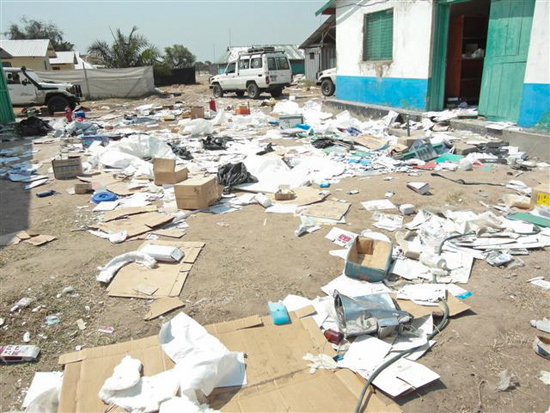Day 34 of the South Sudan conflict – Doctors Without Borders has suspended activities in Malakal, capital of Upper Nile State, after their compound was looted by armed men who threatened staff. This type of incident has happened several times in Malakal, with numerous complaints being reported already this week.
A UN spokesperson in New York stated that the rebels seemed to now be in control of Malakal, after a prolonged battle. Both the Sudan People’s Liberation Army (SPLA) and the rebels had claimed control of Malakal. Some reports are saying that the town remains divided still. Government Information Minister Michael Makuei denied that the rebels control Malakal.
The government still aims to fully retake the town. Bentiu was also the scene of a battle Wednesday, as the government continues its war on the rebels in Unity State. SPLA spokespeople have stated that the government is also advancing on Bor, and have ordered civilians in Bor to evacuate the area.
The South Sudanese government has welcomed Ugandan military aid. Uganda sent military aid initially to protect Ugandan civilians and interests in South Sudan. The Ugandan parliament sat this week to consider the Ugandan Peoples Defence Forces (UPDF) presence in South Sudan. The parliament voted to support the UPDF’s role in South Sudan. Ugandan intervention has been warned against by the UN and other interested parties because it might fuel the crisis. The rebels have also protested foreign military intervention in what they would prefer to be kept a national conflict.
Robberies have hit aid agencies in other locations. In Bor, Jonglei State, and Bentiu, Unity State, a combined total of 20 UN vehicles have been taken by armed men. Vehicles have been commandeered by warriors from both sides of the conflict in many areas over the past weeks. There have also been cattle raids, shop arsons and many other destructive activities in affected areas.
Hilde Johnson, the head UN official in South Sudan, has called on Dr. Riek Machar to instruct forces loyal to him to immediately return the looted items.
The government seized the entire 1500-print run of the Juba Monitor’s Thursday paper. The reason was two articles contained in that paper. One of the articles was a proposal for an interim government until the 2015 elections. This proposal was written by the Monitor’s editor-in-chief. The other article was a piece about historical tensions within the SPLA army. The papers, which are printed in Khartoum, Sudan, were seized Wednesday night on arrival at the Juba airport. The editor complained to media agencies about the revenue lost due to the seizure, explaining that the paper’s scant advertising sponsors would not pay for the confiscated papers.
Many reporters and news agencies have been threatened recently. Harrassment of print news agencies by the South Sudanese government is commonplace. Only a small portion of mostly-illiterate South Sudan gets their news from print anyway, however; most South Sudanese listen to radio. But radio has also been shut down in three areas: Bor, Bentiu, and Malakal—the three main occupation areas of the rebels.
Nearly 500 000 people are displaced and 85 000 have fled to neighboring countries since the fighting broke out December 15 as the result of a disagreement within the government ranks. The details of this disagreement have been given by both the government and Machar-loyal forces, but the accounts conflict strongly. Peace talks, taking place in Addis Abada, are the main hope for reconciliation in this conflict, but those peace talks have not so far achieved any tangible success. President Kiir remains in Juba from which he directs the government. Machar remains in hiding, and his control over the rebels in South Sudan has been questioned.
By Day Blakely Donaldson
Sources:
